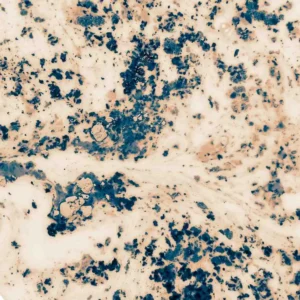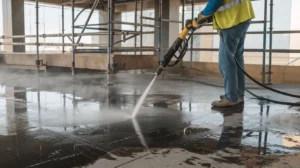How to Clean a Granite Composite Sink starts with understanding the unique materials that make up these stylish yet durable fixtures. Granite composite sinks are crafted by combining crushed stone with resin, creating a surface that is both elegant and highly resistant to scratches and stains. However, their porous nature makes them prone to water spots, mineral deposits, and discoloration if not cleaned properly, which is why they require special care to maintain their beauty and functionality.
Regular maintenance is essential to preserve the sleek appearance of a granite composite sink and ensure it lasts for years. Proper cleaning prevents stubborn stains, dull spots, and surface damage that can occur from harsh chemicals or abrasive scrubbers. By adopting the right cleaning methods, you can keep your sink looking brand new, while avoiding costly repairs or replacements down the line. A well-maintained sink doesn’t just enhance the kitchen’s look it also adds long-term value to your home.
Understanding Granite Composite Sinks

Granite composite sinks have become increasingly popular in modern kitchens due to their durability, sleek appearance, and resistance to scratches and stains. However, these sinks require specific cleaning methods to maintain their beauty and functionality over time. To understand the best way to care for your sink, it’s essential to know what granite composite sinks are made of, how they differ from quartz sinks, and why they need special cleaning products and techniques.
What Are Granite Composite Sinks Made Of?
Granite composite sinks are crafted from a combination of crushed stone and acrylic resins. Typically, they are made up of around 70-80% granite or quartz particles, bonded with a durable resin to create a non-porous, solid surface. This blend gives the sink a natural stone appearance while making it stronger and more resistant to cracks and chips compared to traditional stone or stainless steel sinks.
The high percentage of natural stone in granite composite sinks not only makes them visually appealing but also provides excellent heat resistance. They can withstand hot pots and pans without warping or cracking, which is a significant advantage in a busy kitchen.
Differences Between Granite Composite and Quartz Sinks
While granite composite and quartz sinks may look similar, there are notable differences in their composition and characteristics:
Material Composition:
Granite composite sinks are made by combining crushed granite dust with durable resin, creating a strong, non-porous surface. In comparison, quartz sinks are crafted from quartz particles mixed with resin, though they typically contain a slightly lower percentage of natural stone than granite composite sinks.
Durability:
Both types of sinks are highly durable and resistant to chipping, scratching, and stains. However, granite composite sinks tend to have a slight edge in terms of strength and heat resistance, making them a preferred choice for high-traffic kitchens.
Appearance:
Granite composite sinks often have a more natural stone-like texture, whereas quartz sinks tend to have a smoother, more uniform finish. Depending on the look you’re going for, granite composite sinks can offer a more organic feel, while quartz sinks provide a polished, modern aesthetic.
Weight:
Granite composite sinks are typically heavier than quartz sinks due to their higher stone content. This means they may require additional support when installed, especially if you’re opting for an undermount sink.
Why These Sinks Require Specific Cleaning Products and Techniques
Granite composite sinks are highly resistant to damage, but they aren’t invincible. Using the wrong cleaning products can dull their surface, cause discoloration, or even damage the protective coating. Harsh chemicals, abrasive cleaners, and steel wool should be avoided as they can scratch the surface and strip away the sink’s finish.
Instead, the best way to maintain a granite composite sink is to use gentle cleaning agents like dish soap, baking soda, and vinegar. These natural cleaners effectively remove stains and grime without causing damage. For deeper cleaning, a soft cloth or non-abrasive sponge is ideal.
Since granite composite sinks are non-porous, they’re less likely to absorb stains or odors compared to traditional stone sinks. However, minerals from hard water can still leave deposits on the surface, especially in black or white sinks. To prevent this, it’s essential to dry the sink after each use and clean it regularly with the right products.
If you want to learn how to clean a granite composite sink properly, understanding the material’s unique properties will help you choose safe and effective cleaning methods. With regular care and maintenance, your sink can remain as beautiful and functional as the day it was installed.
By keeping these cleaning guidelines in mind, you’ll not only preserve the look of your granite composite sink but also extend its lifespan, ensuring your kitchen stays stylish and efficient for years to come.
Tips to Clean a Quartz Sink or Granite Composite Sink
When learning how to clean a granite composite sink, it’s important to use gentle methods to avoid damaging the surface. Both granite and quartz composite sinks are durable but can lose their luster if cleaned with harsh chemicals or abrasive tools. Start by wiping the sink daily with a soft sponge and mild dish soap to remove food particles and prevent stains from setting in. Rinsing thoroughly after each use helps keep the sink free from water spots and soap residue.
Stick to non-abrasive cleaners like baking soda for tougher stains. Avoid steel wool, bleach, or harsh chemicals, as these can scratch the surface and dull the sink’s finish. For best results, adopt a regular cleaning routine, wiping it down daily and doing a deeper clean once a week. Maintaining proper care ensures your sink stays spotless, and knowing how to clean a granite composite sink will keep it looking brand new for years.
If you’re also looking to preserve other surfaces in your home, consider our marble services to keep your countertops and tiles in pristine condition. Regular maintenance and expert care will extend the life of your stone surfaces, ensuring they remain beautiful and functional.
Special Care for Black or White Composite Sinks

Proper care for black and white granite composite sinks can help maintain their sleek appearance while preventing common issues like water spots and stains. Whether your sink is dark or light-colored, using the right products and methods is essential to keep it looking new. Here’s how to clean a granite composite sink based on its color to ensure it stays spotless and damage-free.
Black Sinks: How to Prevent Water Spots and Mineral Deposits
Black composite sinks are prone to water spots and mineral deposits, which can dull their shine over time. To prevent this, always dry the sink with a soft cloth after each use to eliminate excess water. Use a gentle cleaner, like a mixture of baking soda and mild dish soap, to tackle daily grime without causing damage. Applying a thin layer of mineral oil once a week can help protect the surface and enhance the sink’s natural sheen.
Avoid using steel wool or abrasive cleaners, as they can scratch the surface and make water spots more visible. By cleaning your sink regularly and keeping it dry, you can maintain its dark, elegant finish without the worry of stubborn stains or dull patches.
White Sinks: How to Prevent Discoloration and Staining
White composite sinks can be more prone to staining from food, beverages, and harsh cleaning products. To prevent discoloration, rinse the sink thoroughly after each use, especially if you’ve been washing items that could leave behind stains, like coffee mugs or wine glasses.
For deeper cleaning, use a paste of baking soda and water to remove stubborn stains without damaging the acrylic resin surface. Avoid harsh chemicals like bleach, as they can cause discoloration over time. Instead, stick to gentle, non-abrasive products to keep the sink bright and clean.
Best Products to Use for Dark vs. Light Sinks
When learning how to clean a granite composite sink, it’s important to choose products that suit the sink’s color. For black sinks, use mineral oil or mild cleaners to prevent water spots and enhance shine. For white sinks, focus on stain prevention with baking soda and gentle scrubbing. Never use abrasive cleaners or steel wool, as they can damage both dark and light sinks.
With regular care and the right products, cleaning your sink becomes easier, and your granite composite sink will stay beautiful and functional for years to come.
How to Clean a Granite Composite Sink: Do’s & Don’ts for Daily Use
Keeping your granite composite sink clean and well-maintained requires adopting the right habits. Here are the essential do’s and don’ts to ensure your sink remains in perfect condition for years to come.
✅ Do’s
- Rinse after each use:
After washing dishes, rinse the sink thoroughly with water to remove food particles, soap residue, and minerals that can cause stains over time. - Use mild dish soap and a soft sponge:
Use a small amount of mild dish soap with a non-abrasive sponge to gently scrub the sink. This removes dirt without damaging the surface. - Dry the sink to prevent water spots:
Use a microfiber cloth to dry the sink after each use. This prevents water spots and keeps the sink looking polished and clean.
❌ Don’ts
- Avoid abrasive cleaners and steel wool:
Never use abrasive cleaning products, steel wool, or an abrasive sponge to scrub your sink. These can scratch the surface and dull it’s finish over time. - Don’t leave acidic or staining substances for long:
Acidic liquids like coffee, wine, or citrus can stain the sink if left for too long. Rinse immediately to avoid permanent marks and prevent damage to the surface. - Don’t use harsh chemicals:
Cleaning products with harsh chemicals like bleach or ammonia can damage the surface of your sink. Stick to gentle, pH-balanced cleaners for safe maintenance.
Following these simple do’s and don’ts to clean a granite composite sink will help keep your sink looking beautiful and free from scratches, stains, and dull spots. Regular care makes all the difference!
How to Clean a Granite Composite Sink with Baking Soda

Baking soda is one of the best natural solutions for maintaining your granite composite sink. It’s gentle, effective, and doesn’t rely on harsh chemicals that could damage the surface. Here’s a simple step-by-step guide to deep cleaning your sink with baking soda.
Step 1: Wet the Sink
Start by thoroughly wetting your sink with warm water. This helps loosen dirt, mineral deposits, and leftover food particles, making it easier to clean.
Step 2: Sprinkle Baking Soda Across the Surface
Evenly sprinkle a generous amount of baking soda over the wet sink. Focus on areas that have stains or buildup to ensure a deep clean.
Step 3: Gently Scrub with a Soft Cloth or Sponge
Using a soft cloth or sponge, gently scrub the sink in circular motions. Avoid using anything abrasive, as it can scratch the surface. Baking soda is mild yet powerful enough to break down grime without harming the sink’s heat-resistant finish.
Step 4: Rinse Thoroughly
Once you’ve scrubbed all areas, rinse and dry the sink thoroughly with clean water. Make sure to remove all traces of baking soda to avoid residue.
Step 5: Dry with a Soft Towel to Prevent Water Spots
After rinsing, use a soft towel or microfiber cloth to dry the sink completely. This helps prevent water spots and keeps your sink looking polished.
Benefits of Baking Soda for Cleaning Granite Composite Sinks
Baking soda offers a safe and effective way to clean your sink without the need for harsh chemicals. It helps remove tough stains, deodorizes the surface, and prevents mineral deposits from dulling the sink’s finish. Knowing how to clean a granite composite sink with baking soda ensures proper care while preserving the sink’s appearance and durability.
Final Maintenance Tips for a Granite Composite Sink
Keeping your granite composite sink looking new requires regular maintenance and the right products to protect its surface. We understand the importance of proper care to ensure your sink stays beautiful and lasts for years. Here are some essential tips to keep your sink spotless and damage-free.
How to Keep Your Sink Looking New
The key to maintaining your granite composite sink is consistency. Rinse the sink after every use to prevent residue buildup and stains. Use gentle cleaning techniques with soft cloths and mild soaps to protect the surface from scratches. For long-term shine, apply a protective treatment like our Stone Sealer Restoration Shield, designed to enhance your sink’s finish and protect against daily wear and tear.
Suggested Cleaning Products for Ongoing Maintenance
Choose cleaning products that are gentle yet effective for granite composite sinks. Avoid abrasive cleaners or harsh chemicals that could damage the skin’s surface. Our Stone Sealer Restoration Cleaner is formulated specifically for composite sinks, providing a safe and effective solution to remove stains, mineral deposits, and water spots without causing any harm. Pair it with a microfiber cloth for a streak-free finish.
The Importance of Drying the Sink After Use
Drying your sink is a crucial step in preventing water spots and mineral buildup. After rinsing, use a soft towel or microfiber cloth to wipe down the sink. This simple habit keeps your sink looking polished and prevents unsightly spots from forming.
For an added layer of protection, our Stone Sealer Restoration Mineral Guard creates a water-repellent barrier that reduces mineral deposits and keeps your sink looking brand new.
By following these tips and using trusted products from Stone Sealer Restoration, you’ll keep your granite composite sink in pristine condition for years to come. Protect your investment with proper care, and let us help you maintain that sleek, modern look in your kitchen.
Final Thoughts
Proper maintenance is key to preserving the beauty and longevity of your granite composite sink. As we discussed, cleaning with gentle products like dish soap, baking soda, and vinegar ensures your sink stays free of stains and scratches, while avoiding harsh chemicals and abrasive materials prevents damage. Regular care, including drying the sink after each use, will help avoid water spots and mineral buildup, keeping your sink looking pristine for years.
At Stone Sealer Restoration, we specialize in granite restoration services, ensuring your sink remains as beautiful and functional as the day it was installed. Our expert team provides professional installation and maintenance solutions to keep your granite composite sink in top condition.
Don’t let your sink lose its shine or durability. Regular care and professional restoration can prevent wear and tear, extending the lifespan of your sink.
Interested in expert installation or granite restoration services? Contact us at Stone Sealer Restoration today to schedule a consultation and ensure your sink stays in perfect shape for years to come.






